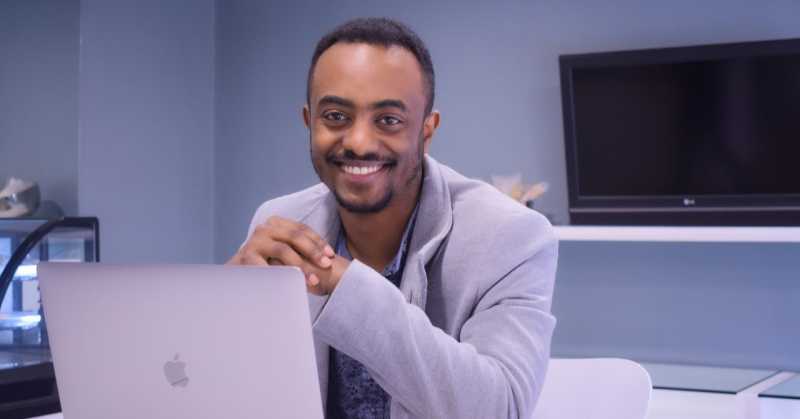Dawit Abraham, Founder and CEO of Qene Games: An Exclusive Interview with Loline Mag

loline Interview with dawit abraham,qene games,ethiopian gaming company,kukulu app,gebeta app]]Dawit Abraham is the Founder and CEO of one of the first Gaming companies in Ethiopia, called Qene Games. Dawit came up with the name Qene for his company. He was thinking about what the most intelligent thing we had as a country.
Dawit Abraham is the Founder and CEO of one of the first Gaming companies in Ethiopia, called Qene Games. Dawit Abraham studied Electrical and Computer Engineering at Addis Ababa University. He is also a Software Engineer and a Mobile Developer by profession.
From a young age, Dawit hated going to school, which was one of his defining characters. He did not hate education, but he did not like going to school. Going down memory lane, Dawit told us that he used to teach while he was in Kindergarten. Dawit used to be homeschooled by his father and would surpass the kids at school; hence, he did not want to go to class to learn. He would argue with the teachers, saying he would only go to class if he could teach.
Dawit had a strict family regarding education. For this reason, he was very good at school, and he would rank in the top three in his class. After he got into high school, he was more of a self-taught. Instead of listening to the teacher, he sat at the back of the class, reading books. But when exams came up, he studied very hard and ultimately got good grades. When he was in grade 12, he scored the highest mark on his Matriculation Exam.
Dawit enrolled in Addis Ababa University to study Electrical and Computer Engineering. In his 2nd Year, amazingly, for the first time, he got introduced to programming. He fell in love with it and started coding relentlessly. At that time, there was no continuous assessment at the University. There were only two exams, the mid and the final. For this reason, he only attended ten to twenty percent of the classes, and with the other time, he would be home coding. Because of that, he was not even in the group photo in his yearbook.
Despite missing most classes, Dawit used to participate in University clubs. One of the clubs had different programmers, electricians, and seniors that would develop various things. Dawit was excited about what they did, so he would try to mimic them. Some people there also practiced animation, which paved the way for Dawit to develop games.
Dawit's instructor used to give students assignments to make games. So in his third year, Dawit built his first game, a Chess game. And after that, he kept coding and got introduced to different programming and gaming tools.

Dawit wanted to join iCog Labs for an internship. So he went there and tried to apply. But because his grades were low, he did not meet the requirement to join iCog Labs. At that moment, Dawit was mad at himself and thought he messed his life up by missing his classes and getting low grades. Dawit, not giving up, went to talk to iCog Labs' CEO and asked him how he can join them. He interviewed Dawit and told him to take the entrance test and that it was ok, even if his grade was lower. Excitingly, Dawit took the test and got the highest scores; this signifies that grades do not matter but practicality in fields like Software Engineering. After that, he interned in iCog Labs and eventually got hired there.
By his fifth year, Dawit was working on different gaming tools. Then Dawit said, "You know what, I am going to make my own game." He thought about a bunch of ideas. Then he decided to make an infinite runner game named Kukulu.
After that, Dawit joined the ICT COE competition. In the competition, they gave prizes to the top three and the top ten, a place in an exhibition to showcase their works. For this reason, Dawit was very excited to participate in the competition. He mainly entered the competition because it would provide him a deadline to finish his game. Then Dawit ranked seventh out of ten. Following, he went to the exhibition to showcase his game. He saw that things had changed, and only the top five got to present their products. He was devastated because he has worked tirelessly for a year to participate in this exhibition. Dawit did not easily give up, so he brought the sixth chair next to the five presenters and started presenting his game. Many people were passing by and checking out the exhibition. Soon after, someone that worked in marketing at a company called Gebeya saw Dawit showcasing. She said to him, "There might be something we could do with your game. You should come to our office." Dawit would not have met her if it was not for his courage to present there. He went to Gebeya and met with the co-founders. And this is how he got his first funding, which, in turn, led him to open Qene Games.
Dawit came up with the name Qene for his company. He was thinking about what the most intelligent thing we had as a country. And that is Qene. Dawit loved the smartness and wittiness of Qene. It was both creative and Ethiopian; therefore, Dawit said, we should go with the name Qene.
To keep making games and sustain his company, Dawit worked remotely in different companies outside Ethiopia. He has worked in New York and countries in Europe. He did that until they made the game Gebeta, which was very successful. For Gebeta, they managed to get a publisher. What was great about the publisher is that they would fund the games that they published. Because of this, Dawit and his team got some relief. After that, they managed to raise more funding.

We asked Dawit what he wanted people to take away from him and his experience. For the Techies, he said, "Technology is absolutely a marketable skill to have, and having a marketable skill is truly important in whatever you want to do. When it comes to my experience, if I were not a Software Developer and did not have that marketable skill, Qene games would not be where it is now. When Qene was struggling as a company, the only way I was supporting it was by selling my marketable skill as a Software Engineer."
For those who want to open up a business of some sort, Dawit said: "Consider if I sold 100 Birr for 1 Birr, there would be a line that is so long, I would not comprehend it. When you try to create a business, forget everything else and try to answer the question, 'Is the thing that I am trying to sell valuable or not?' Or if you are sure it is valuable to people, and they do not know it, answer the question, 'how do I make them know that it is valuable to them?' For example, if you are trying to launch an e-commerce software to sell shoes, you should know that you are not selling the software; you are selling shoes."
For his last words in our interview, Dawit said:
"We have the power to make or break this country and this continent. Realizing that power is the first step because we actually can. We need to do something with it. If enough of us become outstanding and break out, so will the country and the continent. So let us realize that power."
